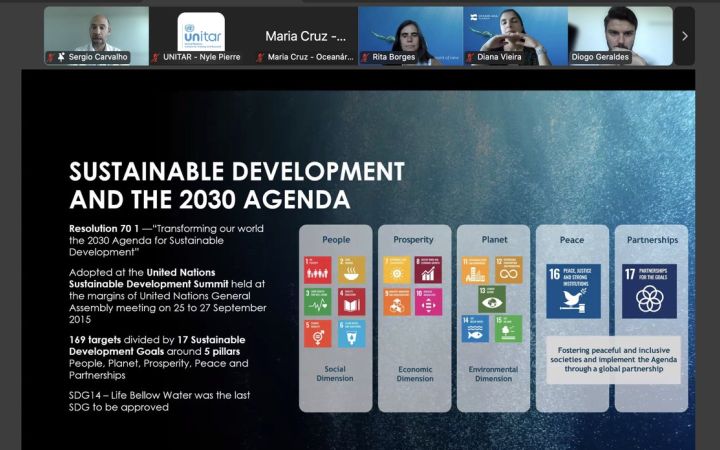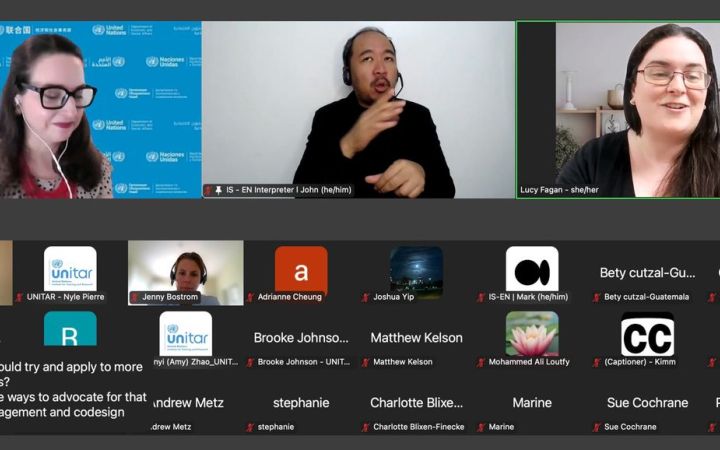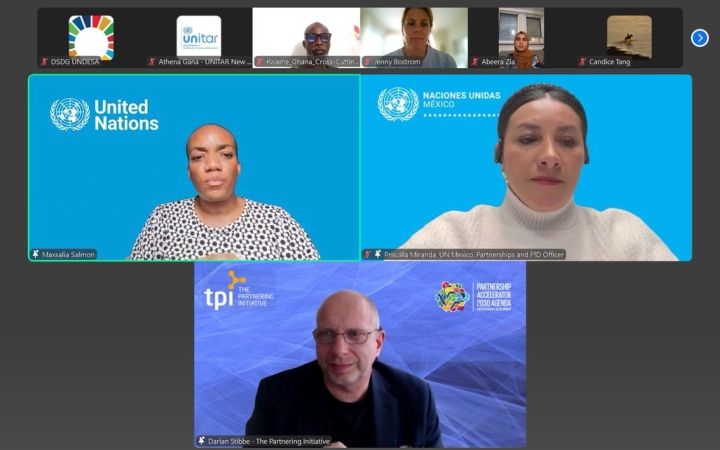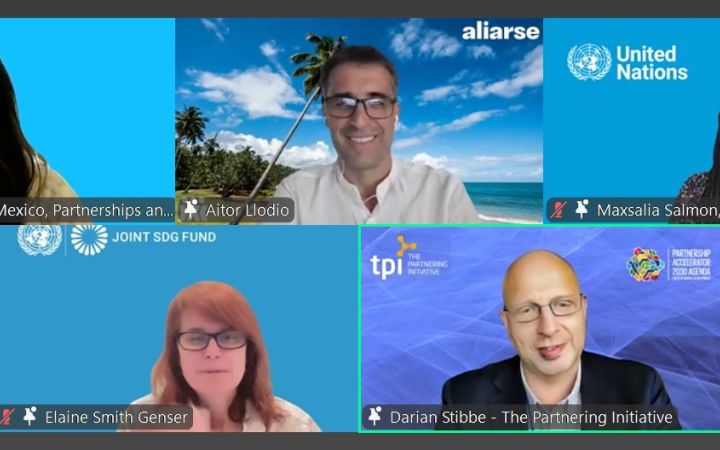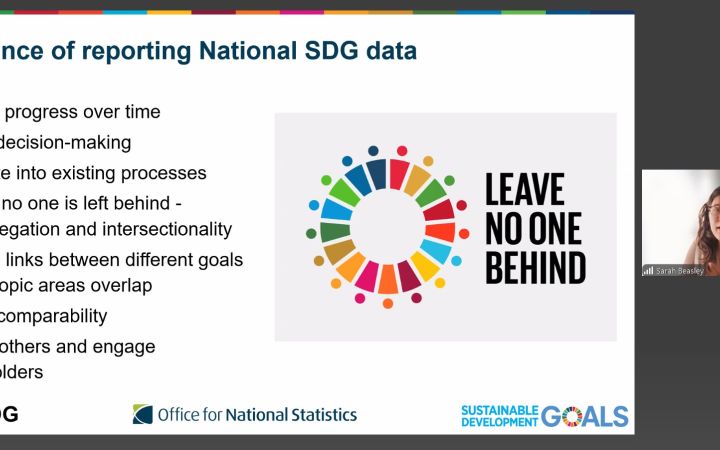July 14, 2025, New York, USA — UNITAR office in New York, in partnership with the UN Department of Economic and Social Affairs (UN DESA), launched the 2025 edition of the SDG Learning, Training and Practice series—SDGs in Practice—as a Special Event from July 14 to July 23, 2025 on the margins of the High-Level Political Forum (HLPF) on Sustainable Development. Designed to accelerate implementation of the 2030 Agenda, each session brought together global experts, practitioners, and stakeholders to share tools, knowledge, and practical solutions aligned with the Sustainable Development Goals (SDGs). This fully virtual capacity-building initiative aims to equip a global audience with the knowledge, tools, and partnerships needed to accelerate progress toward the 2030 Agenda.
The series opened by welcoming over 80 participants to the first session, “From HIV to Health for All: Accelerating SDG 3 Through Practical Partnerships and Solutions,” which focused on health equity and multi-agency collaboration. Representatives from UNAIDS, WHO, UNICEF, UNDP, UNFPA, and UN Women highlighted the urgency of collective action to advance health and gender equality, launching a conversation on cross-sector solutions to advance SDG 3 and SDG 5 in tandem.
July 15, 2025 - TUESDAY
The second session “Accelerating Progress on SDG 5," focused on gender equality, opened with a strong message from UN Women Senior Advisor Alice Shackelford highlighted the need for united, collective efforts to advance gender equality. Senior Evaluator Mariangela Bizzarri unpacked new data points from the Gender Snapshot 2024. In breakout rooms, participants explored 5 key levers for #SDG5 progress: women in tech, climate resilience, equal pay, gender finance, and grassroots organizing. The session closed with a call for systemic reforms and cross-sector solutions to gender equity, in order for the world to move forward—together.
In the third session, “Green Growth and Resilience Building,” experts highlighted Indigenous leadership, green innovation, and intersectoral collaboration for climate resilience. Dario Mejía, Technical Secretary of FILAC, and Dr. Myrna Cunningham Kain, Vice President of FILAC and Chair of the Pawanka Fund, opened by addressing climate resilience rooted in Indigenous knowledge and Indigenous contributions to sustainability. NOAH Re’Planet co-founders Frédéric Degret and Jennifer Warren continued the conversation, showcasing private-sector innovation in green technology. Simonetta Di Pippo followed, bridging space and quantum technologies with climate action, moderating a discussion between Francesca Schiavello (OQI) and Giuseppe Santangelo (I4T Foundation) on the implementation of these technologies in to advance SDG objectives. The session was concluded by Sarah Rammah, who led an interactive participant reflection via live poll.
July 16, 2025 - Wednesday
The fourth session, “A Sustainable Blue Planet: Protecting, Innovating & Educating,” co-hosted by Oceano Azul and Oceanário de Lisboa, focused on ocean conservation and marine education. Speakers presented key data on ocean conditions and emphasized the need for Marine Protected Areas. Over 60 participants joined, raising critical questions on how ocean conservation can be scaled up through the effective establishment and implementation of these protected marine areas. Discussions also included practical solutions and movements to drive the transition to sustainable blue economies. Particularly, a key initiative of the Portuguese Ministry of Education, "Educating a Blue Generation" —an international push to integrate ocean conservation into school curricula globally!
July 17, 2025 - THURSDAY
In session five, “Inclusive Policy and Stakeholder Engagement for the 2030 Agenda,” accessibility and inclusion were central themes. Naiara Costa, Senior Sustainable Development Officer at UN DESA, reflected on her experience across civil society and the UN system, emphasizing the need to strengthen collaboration and ensure institutional space for stakeholder engagement in SDG processes. Panelists from the International Disability Alliance, Commonwealth Medical Trust (Commat), and the Women’s Major Group stressed the importance of ensuring that those most often left behind are actively included in decision-making processes. The discussion spotlighted the structural changes required to embed accessibility, participation, and accountability into SDG implementation.
Session 6 “Building Country-Level Capacity for Multi-Stakeholder Partnerships” built upon the themes of the previous session, exploring how to expand country-level capacity for multi-stakeholder partnerships. The session, co-organized by UN DESA, UN RCO Mexico, and the Together 2030 Initiative, highlighted the tools and skills needed to drive inclusive, whole-of-society SDG action. Priscilla Miranda (UN Mexico) and Maxsalia Salmon (UN RCO Jamaica) stressed the importance of investing in collaborative approaches and making partnerships a core principle. The session stressed how systematic, targeted efforts expand equitable access and cross-sector engagement to advance SDG delivery.
July 18, 2025 - FRIDAY
Session seven, “Strategic Foresight for Sustainable Development: Future-proofing Policy and Partnerships,” focused on how demographic and economic foresight can shape SDG planning. Moderated by UN DESA’s Ariel Alexovich, experts Thomas Spoorenberg of UN DESA and Conrad Hackett of Pew Research unpacked demographic projections from the World Population Prospects. Sebastián Vergara, Economic Affairs Officer at UN DESA, continued the conversation, highlighting fiscal insights from the World Economic Situation and Prospects report, emphasizing the need for data-driven policymaking amid global fiscal challenges.
Session 8, "SDG 8: Investing in Decent Jobs and Just Transitions Through the Global Accelerator," was a deep dive into the Global Accelerator for Jobs and Social Protection. With speakers from the ILO, FAO, and national governments in Indonesia, the Philippines, and Namibia, participants examined how integrated, rights-based policies can fuel just transitions and employment for all. Omar Benammour (FAO) moderated, with opening insights from Sangheon Lee (Director of Employment Policy Department, ILO) on the Global Accelerator for Jobs and Social Protection. Dr. Maliki, Deputy Minister at Indonesia’s Ministry of National Development Planning, and Undersecretary Carmela Torres of the Philippines shared country examples of policy integration. Hopolang Phororo, UN Resident Coordinator in Namibia, emphasized multilateral collaboration, supplemented by Céline Peyron Bista and Mauricio Dierckxsens’ (ILO) presentation on Global Accelerator tools. Special Representative to the UN and Director of the ILO Office for the United Nations Cynthia Samuel-Olonjuwon concluded with a call for bold investments in inclusive labor systems.
July 22, 2025 - TUESDAY
The ninth session, “Investing in Multi-Stakeholder Partnerships for the SDGs,” co-organized by UN DESA, RCO Mexico, and the Partnering Initiative, brought together global funders and strategists to discuss innovative funding models for SDG partnerships. The discussion was opened by Ola Goransson of UN DESA's Division for Sustainable Development Goals, followed by a moderation discussion by the Partnering Initiative's Darian Stibbe, emphasizing shifting from fragmented, project-based funding to collaborative, systems-level financing models that scale impact and unlock co-benefits. Experts, including Aitor Llodio, Eva Rehse, and Elaine Smith Genser, reinforced to participants the importance of enabling environments, long-term sustainability, and inclusive funding to scale multi-stakeholder partnerships for the SDGs.
July 23, 2025 - FRIDAY
The series concluded with session ten, “Digital Platforms and Data Innovation for SDG Implementation and Monitoring,” introduced by UN Statistics Division's SDG Monitoring Section Chief Yongyi Mi, who highlighted the evolving data ecosystem underpinning the 2030 Agenda. Statistician Heather Page stressed closing global data gaps, while Daniel Eshetie offered a live demonstration of the new UN Data Platform. Speakers from across the world showcased advances in geospatial, citizen, and open data tools for SDG monitoring, as Youngshil Park, shared Korea’s use of mobile and satellite data, Khalid Abu Khalid, presented Palestine’s geospatial data applications, the Dominican Republic's National Statistics Office showcased how non-traditional sources can support resilience and SDG progress, and Sarah Beasley, outlined the UK’s open-source implementation of Open SDG.
With participation from across continents and sectors, each session of the 2025 SDGs in Practice series reaffirmed its core mission: to build capacity, foster collaboration, and deliver practical, scalable solutions to accelerate SDG implementation worldwide.
For full recordings, speaker lists, and upcoming learning opportunities, visit: https://sdgs.un.org/2025/SDGsinPractice





